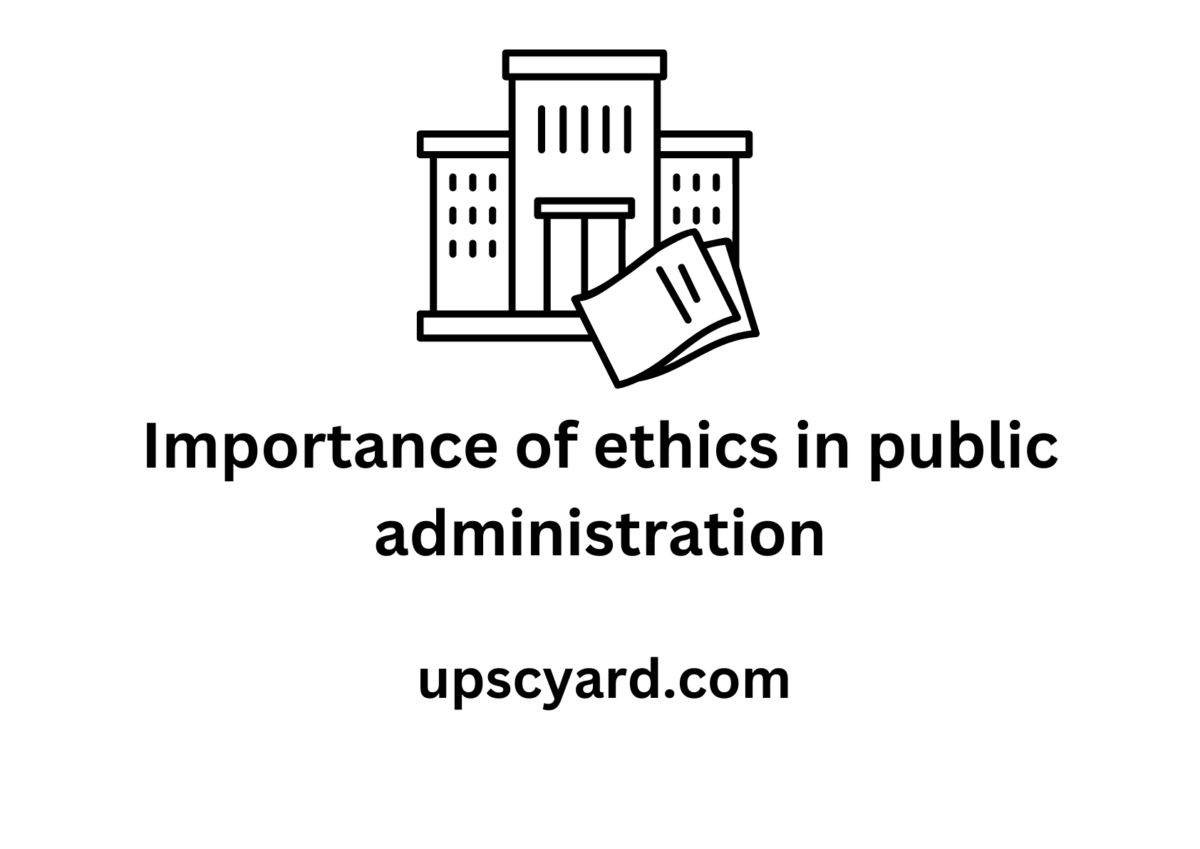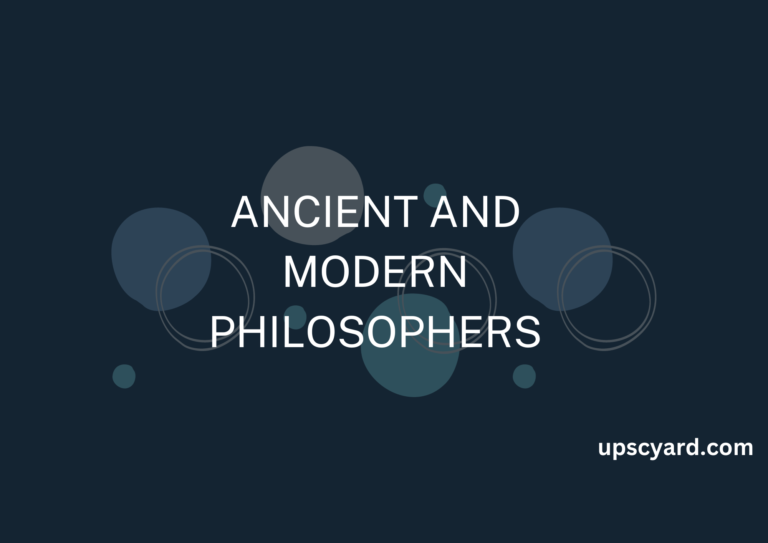Importance of Ethics in Public Administration
An administration earns trustworthiness when it stands firmly on a foundation of genuine human values. After all, without instilling values within individuals, mere surface-level attempts won’t suffice to alter their mindset and conduct.
Ethics holds immense significance in the realm of public administration due to a multitude of reasons:
- Fostering Public Confidence: Public administrators bear the responsibility of serving the interests of the public and managing public resources. Embracing ethical conduct establishes a sense of trust and confidence among the public, reinforcing their faith in the administrative system.
- Accountability and Transparency: Ethical behavior in public administration cultivates a culture of accountability and transparency. Administrators who abide by ethical principles are more likely to be answerable for their actions, ensuring that decisions and actions are open to scrutiny.
- Promoting Fairness and Justice: Ethical considerations serve as the bedrock of fairness and justice in public administration. Administrators must treat all individuals and groups equitably, free from bias, ensuring that resources and services are accessible to all on an equal footing.
- Guiding Decision-Making and Problem-Solving: Ethical frameworks provide a compass for making well-founded decisions and resolving complex problems. Administrators must factor in ethical principles, values, and standards when confronted with difficult choices to achieve outcomes that benefit the public at large.
- Upholding Integrity and Professionalism: Ethical behavior upholds integrity and professionalism within public administration. Administrators who exhibit ethical conduct enhance the reputation of their profession and inspire trust in the system.
- Exemplifying Ethical Leadership: As leaders, public administrators have the responsibility to serve as ethical role models for their subordinates and the wider community. Ethical leadership fosters a culture of integrity and encourages ethical conduct among employees.
- Combating Corruption and Misconduct: Ethics acts as a bulwark against corruption and misconduct in public administration. Well-defined ethical guidelines and codes of conduct help prevent abuses of power, bribery, nepotism, and other forms of unethical behavior.
Gandhian Perspective
Gandhiji emphasized the absence of distinct divisions between personal, private, and social ethics. To him, the concept of Dharma was all-encompassing, embodying duty, religion, and ethics.
In the Indian tradition, Dharma encompasses moral conduct, representing righteous behavior. Mahatma Gandhi elevated Dharma to a loftier level, signifying a quality that connects us to our duties in human life and our connections with others.
Gandhi’s ethical framework centers on the purushartha, delineated by Lord Krishna in the Bhagavad Gita. His ethical principles comprise non-violence, humanity, truth, self-accountability, and a steadfast rejection of the distracting vices of modernity. Let us delve into the Gandhian viewpoint on ethics in public administration:
Non-violence in the political context – For Gandhi, political non-violence denotes embracing a virtuous life founded on the pursuit of truth. He underscores that non-violence is not a direct call to revolution but a commitment to the rule of law through virtuous practical action that involves principled dissent against its application or certain content.
As a doctrine of peaceful resistance, practicing non-violence entails taking responsibility for defying the law while eloquently stating the reasons for disagreement. Furthermore, non-violence encompasses refraining from thoughts or deeds that cause harm, even mentally, to any living being.
Gandhi believes that upholding a stance of non-violence necessitates continuous vigilance over one’s thoughts and actions, requiring virtues like the pursuit of truth, humility, accountability, and satyagraha.
Kautilya’s Perspective
Kautilya’s notion of the ‘Rajrishi’ holds significant weight in effective rulership, resembling Plato’s concept of the ‘philosopher king.’ Kautilya’s ethical insights into public governance, presented in his treatise Arthashastra, can be summarized as follows:
- Leadership and Intelligence: A ruler should possess astute leadership and intelligence, guided by moral principles in governing.
- Harmonized Role: The king should harmonize his individuality with his responsibilities, functioning as a well-guided administrator.
- Balanced Approach: The ruler should navigate a middle path, avoiding extremes while staying focused on achieving the overarching goal.
- Salaries and Allowances: Clear and consistent compensation, both for the king and public servants, should be established.
- Maintenance of Law and Order: Upholding law and order is the king’s primary obligation.
- Preventive and Punitive Measures: Taking proactive steps to curb corruption and instituting appropriate punitive measures against errant officials.
Mains Question : Ethics in public administration
Q. The imperatives of administrative ethics are necessarily an antidote to “I was only obeying the orders” argument by public officials. Explain.
Summary :

In the movie “Judgment at Nuremberg,” Chief Judge Dan Haywood faced a challenging situation. He presided over a tribunal tasked with trying four German judges accused of aiding forced sterilization and ethnic cleansing of Jews, homosexuals, and others during the Nazi regime under Hitler.
The defense argued that judges and civil servants merely follow the country’s laws and should not be held accountable for the atrocities committed.
However, can the excuse of ‘doing my duty’ justify not standing up against injustices and cruelty perpetrated by the State under Hitler? The answer is a resounding NO.
A. Detailed answer
Individual Moral Accountability: Administrative ethics highlights the importance of individual moral accountability for public officials. It asserts that each person has a responsibility to independently assess the morality of their actions and cannot evade accountability by simply obeying orders. Ethical principles demand critical evaluation of the rightness or wrongness of their decisions, even when faced with authority.
Ethical Guidelines and Values: Administrative ethics establishes clear ethical guidelines and values that govern the behavior of public officials. These standards go beyond blind obedience and require officials to consider the ethical consequences of their actions. They are expected to act in accordance with principles of fairness, justice, integrity, and the greater public good, rather than blindly following questionable orders.
Ethical Decision-Making Process: Administrative ethics promotes ethical decision-making processes that involve critical thinking, moral reasoning, and consideration of potential consequences. Public officials are encouraged to use their judgment and make morally justifiable decisions, even if they conflict with superiors’ directives. They are responsible for ethical conduct and cannot solely rely on orders as a justification.
Preventing Unethical Practices: Administrative ethics serves as a safeguard against perpetuating unethical practices. It acknowledges that unquestioning obedience can lead to harmful outcomes. By encouraging ethical behavior, administrative ethics prevents public officials from engaging in actions that violate human rights, disregard the rule of law, or harm the public interest.
Preserving Professional Autonomy: Administrative ethics upholds the concept of professional autonomy and independent judgment for public officials. It recognizes their expertise and knowledge in making ethical decisions. Officials are expected to use their professional judgment to assess the moral implications of their actions and make choices that align with ethical principles.
In summary, administrative ethics counteracts the “I was only obeying orders” argument by emphasizing individual moral responsibility, establishing ethical standards and values, promoting ethical decision-making processes, mitigating unethical practices, and upholding professional autonomy. It asserts that public officials have a duty to act ethically and cannot absolve themselves of responsibility by simply following orders that may be ethically dubious or morally wrong.
Resources : Ethics in public administration
The 2nd ARC Reports are a valuable resource that contains a wealth of information. This concise summary, spanning approximately 100 pages, encapsulates the relevant sections from the 2nd ARC Reports, including the report on ethics. It focuses on the key observations and recommendations made in these reports pertaining to various facets of governance. This compilation serves as a valuable tool not only for your ethics paper but also for GS Papers 2 & 3, Essay, and Public Administration optional.
By citing the observations from these reports, you can bolster your arguments, while incorporating the recommendations into your conclusions as potential solutions. This comprehensive summary offers a condensed yet comprehensive overview of the essential content found in the 2nd ARC Reports, allowing for an efficient and effective utilization of their insights.
Barefoot Bureaucracy
“Barefoot bureaucracy” refers to a concept that emphasizes decentralized and grassroots approaches to public administration. It promotes the idea of empowering local communities and frontline workers to address the needs of the people they serve. The term originated from the work of Indian administrative theorist Verghese Kurien, who used it to describe the successful implementation of dairy cooperatives in rural India. barefoot bureaucracy a giant Importance of ethics in public administration
A remarkable illustration of the “Barefoot Bureaucracy” concept is exemplified in the pioneering work of Mr. Israel Jebasingh (IAS-2004) during his tenure as a Sub-Collector in Jhargram, West Bengal. His innovative approach to door-to-door governance serves as an excellent model in this regard

Effective Mechanisms – Ethics in public administration
- Accountability and Responsibility: Implementing fixed responsibilities is crucial to ensure the accountability of public services. This approach streamlines processes, minimizing confusion and redundancy.
- Principle of Coordination: All levels within the government’s hierarchical structure should operate in unison, guided by the principle of coordination. This fosters efficient collaboration and synergy.
- Preventive Vigilance: Incorporate surprise inspections by higher authorities to curb potential misuse of power by civil servants for personal gain. Vigilance awareness programs should also be a mandatory practice.
- Rule of Law: Uniform adherence to rules and regulations is vital for all citizens, spanning political executives, administrators, and higher officials. Stripping away excessive VIP privileges encourages an understanding of common citizens’ challenges.
- Citizen Charter: Enforcing the Citizens’ Charter is essential for fostering administrative processes’ accountability, transparency, and responsiveness. This document’s proper execution should be obligatory.
- Enhanced Public Service Delivery: Governmental benchmarks for public service quality and hassle-free delivery should be established. Regular assessment of organizational performance and goal attainment is necessary.
- Grievance Resolution: Building an effective grievance redressal system within organizations is paramount. Continuous efforts to elevate public service quality, informed by user feedback, should be a dedicated pursuit.
Mains Question
Q. “Max Weber argued against the application of personal moral and ethical standards, typically reserved for matters of personal conscience, to public administration. He emphasized the significance of recognizing that state bureaucracy may develop its distinct and independent bureaucratic morality. critical analysis.”
A.
“It’s a well-known fact that the general public often experiences frustration when dealing with bureaucratic institutions. Max Weber’s perspective highlights the significance of distinguishing between the ethical frameworks applicable to public administration and those guiding our personal lives.
For instance, consider a scenario where a Right to Information (RTI) application results in the retrieval of extensive documentation, potentially spanning over 100 pages, containing various commission reports. While it’s essential for public servants to maintain transparency and provide the requested information, the sheer volume of data can be overwhelming for the applicant, leading to a demand for more specific details.
Nevertheless, the concept of allowing bureaucracy to develop its distinct ethical systems has faced criticism for being elitist.”




